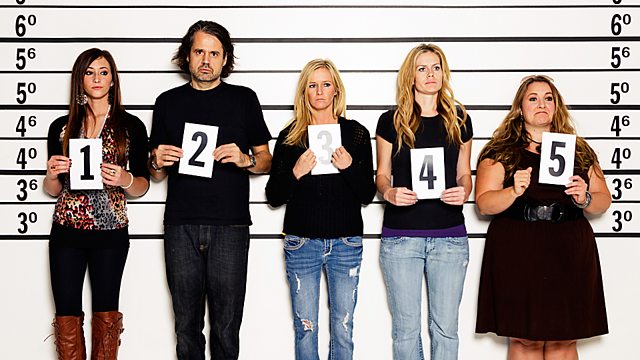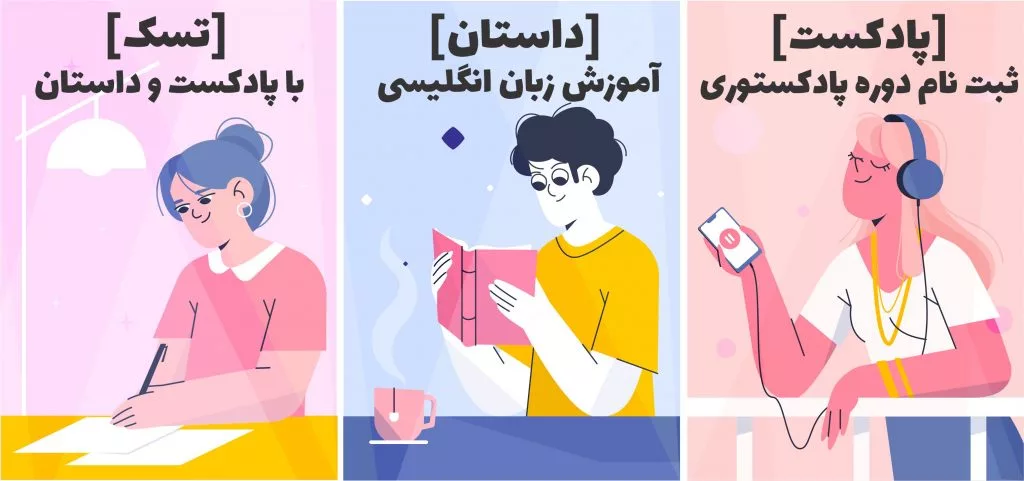پادکست انگلیسی BBC – اعتماد به حافظه
درپادکست انگلیسی BBC – اعتماد به حافظه ، درباره اینکه آیا می توانید به حافظه خود اعتماد کنید؟ صحبت میشه. کاترین و نیل بحث می کنند که چرا پلیس و سیستم حقوقی نسبت به شهادت شاهدان عینی نگران هستند. کارن فکر می کنه که این طبیعی است که مردم بخواهند باور داشته باشند که حافظه می تواند دقیق باشد.
سوال پادکست انگلیسی BBC – اعتماد به حافظه :
In which part of the brain is there an area dedicated to remembering faces? Is it…
a) the temporal lobe?
b) the hypothalamus?
or c) the cerebellum?
به پادکست خوب گوش کن تا جواب رو پیدا کنی.
اگر می خوای گوش دادن به پادکست تا حد امکان برات ساده و کارآمد باشه مراحل زیر را دنبال کن:
هر روز به پادکست گوش کن. وقتی براش یه وقت ثابت در روز در نظر بگیری برات تبدیل به عادت میشه و این عادت هرروز پیشرفت میکنه.
پادکستی رو پیدا کن که موضوعش برات جالب باشه. وقتی از خود موضوع لذت ببری یادگیری هم برات لذتبخش میشه.
به پادکستی گوش کن که transcript یا متن داره. این بهت کمک می کنه تا کلمات و عبارات جدید رو به سرعت در متن پیدا کنی و ساختار انواع مختلف جمله رو خوب یاد بگیری.
پس از گوش دادن به پادکست با متن، در مرحله بعدی سعی کن بدون نگاه کردن به متن این کار رو انجام بدی. این کار مهارت شنیداری رو تقویت می کنه و کمک می کنه تا انگلیسی زبانان بومی را راحت تر درک کنی، حتی اگر خیلی سریع صحبت کنن.
اگه به پادکست انگلیسی گوش کردی و نتونستی کامل متوجه اش بشی، ناامید نشو. پادکست هایESL -English as Second Language بیشماری وجود دارن که برای سطوح مختلف، از ابتدایی تا پیشرفته طراحی شدن. مطمئنا هر روز می تونین یه پادکست مناسب با سطح خودت پیدا کنی.
فراموش نکن که هرچی بیشتر تمرین کنی در اون مهارت رشد میکنی! به قول انگلیسی ها: Practice makes perfect
واژگان کلیدی پادکست انگلیسی BBC - اعتماد به حافظه
| معنی به فارسی | معنی به انگلیسی | واژه |
| دوباره ساختن | rebuild | hyper vigilance |
| دگرگون شدن یا کردن، تغییر دادن یا کردن | changed | distorted |
| صحنه جرم | a place where a crime happened | crime scene |
| آلوده کردن | made impure through contact with an outside source | contaminated |
| تهدید کردن | under threat of being stabbed | at knifepoint |
| گیج کردن، نقشه بر آب کردن | confusing and a bit upsetting | disconcerted |
| شهادت | a spoken statement given in court | testimony |
BBC 6 minute English -Can you trust your own eyes?

برای دانلود پادکست روی سه نقطه سمت راست کلیک و گزینه Download را انتخاب کنید.
متن پادکست انگلیسی BBC - اعتماد به حافظه
Catherine
Hello and welcome to 6 Minute English. I'm Catherine…
Neil
And I'm Neil.
Catherine
So, Neil, do you notice anything different about me today?
Neil
Have you done your hair differently?
Catherine
No.
Neil
Is that a new outfit?
Catherine
Honestly, Neil!
Neil
I give up. I don't know what's different about you.
Catherine
OK. Well, maybe by the end of the show you'll have figured it out. Anyway, today we're discussing memory and whether we can remember things accurately. So are you ready to answer today's quiz question, Neil?
Neil
I am.
Catherine
OK. So in which part of the brain is there an area dedicated to remembering faces? Is it…
a) the temporal lobe?
b) the hypothalamus?
or c) the cerebellum?
Neil
Well, I have no idea. But I'll say a) the temporal lobe.
Catherine
OK and we'll find out whether you chose the correct answer later on in the show. But let's talk more about how our memories can play tricks on us. We tend to think of memory as being like a video recorder that we can replay and recall again and again as it originally occurred. But memory doesn't work like that. It's a reconstructive process.
Neil
A reconstructive process?
Catherine
Yes. We reconstruct - or rebuild - memories, and during this process, they may be distorted – or changed – for different reasons. Let's listen to Tim Valentine, retired professor of psychology at Goldsmith's College at the University of London, talking about this.
INSERT
Tim Valentine, retired professor of psychology at Goldsmith's College, University of London
From all those TV dramas you've watched you'll be familiar with the forensic scenes of crimes officers wearing their paper suits and covering their shoes and their hair to make sure they don't introduce their DNA or physical traces onto the crime scene. So that in the same way anybody who has any interaction with a witness needs to make sure that they don't distort their memory.
Neil
So crime officers wear protective clothing at crime scenes so they don't contaminate it with their DNA.
Catherine
That's right. A crime scene is a place where a crime was committed. And contaminated means 'made impure through contact with an outside source'. So for example, if an officer touches something without gloves on, they introduce new information. And once this has happened, you can't get back to the original information.
Neil
Now, Tim Valentine says that when police officers talk to the witness of a crime, they might also introduce new information. And this could change the witness's memory of what happened.
Catherine
And it isn't only police questioning that can distort memory. Other factors such as stress can affect your ability to recall events accurately. For example, if you're being held at knifepoint you are likely to be concentrating on the weapon rather than on your attacker's face. And at knifepoint means 'under threat of being stabbed'.
Neil
So why do we place so much importance on eyewitness accounts?
Catherine
Eyewitness accounts can sound very convincing in court – but in fact according to research, they are often unreliable. Karen Newirth, senior attorney at the Innocence Project in New York, explains this further.
INSERT
Karen Newirth, senior attorney at the Innocence Project, New York
First, I think it's sort of natural for people to want to believe that memory can be accurate. It's very disconcerting to think that we're going through life relying on our memories and then to learn how mistaken they can be - and how frequently. Second is that the testimony of eyewitnesses has become a very expected piece of criminal trial so jurors sort of anticipate it, look for it, and tend to believe it.
Neil
So we like to trust in our ability to remember things accurately. And it's disconcerting to learn that memory is frequently inaccurate. And disconcerting means…
Catherine
…it means 'confusing and a bit upsetting'.
Neil
Karen Newirth also says that people expect eyewitness testimony – or spoken statements – in court. Do you think that's true, Catherine?
Catherine
Yes – and it's the most commonly used evidence brought against criminal defendants in court, even though they are often inaccurate.
Neil
Are there any ways to improve accuracy?
Catherine
Yes, there are. For example, in a police line-up you can prevent eyewitnesses receiving information from the officer giving instructions, which might influence their response.
Neil
Yes, I see. Well, you didn't give anything away when you asked what was different about your appearance at the beginning of the show.
Catherine
Yes, that's true, Neil. But I can now reveal to you that... I'm wearing glasses, Neil. I've lost my contact lenses!
Neil
I don't know how I missed that. Because actually you do look, well, completely different with glasses.
Catherine
Just a bit, yes. So, now we're running out of time, so let's move onto the answer to today's quiz question. Remember I asked: in which part of the brain is there an area dedicated to recognizing faces? Is it…
a) the temporal lobe?
b) the hypothalamus?
or c) the cerebellum?
Neil
I said a) the temporal lobe. Was I right?
Catherine
You were indeed, Neil! Very well done, it was the correct answer!
Neil
Yes!
Catherine
The main part of the brain dedicated to recognising faces – called the Fusiform Face Area – is positioned in the temporal lobe, which can be found roughly in the area just behind your ears.
Neil
Fascinating! Now, here are the words we learned today…
reconstruct
distorted
crime scene
contaminated
at knifepoint
disconcerting
testimony
Catherine
And that bring us to the end of today's 6 Minute English. Don't forget to join us again soon!
Both
Bye!
امیدوارم از پادکست انگلیسی BBC - اعتماد به حافظه لذت برده باشید.
گوش دادن به پادکست روش خوبی برای تقویت مهارت شنیداری و هم چنین یادگرفتن کلمات در بستر یک موضوع خاصه که این به تقویت مهارت مکالمه انگلیسی نیز کمک زیادی می کنه.
اگه تو هم از اون آدمهایی هستی که از گوش دادن به پادکست لذت می بره برات یه خبر خوب دارم! آموزشگاه زبان انگلیسی 24talk یه دوره طراحی کرده مبتنی بر پادکست و داستان کوتاه به اسم "پادکستوری - Podcastory". این دوره سعی کرده یادگیری زبان انگلیسی رو مناسب با نیاز و سطح زبان آموز به یه فرایند بسیار مفرح، موثر، سریع و کم هزینه تبدیل کنه.
همین الان می تونی با کلیک روی عکس زیر و ثبت نام در دوره ی آموزش زبان انگلیسی با پادکست و داستان ۲۴talk اولین و مهم ترین قدم رو برای یادگیری زبان انگلیسی برداری. وقت رو از دست نده!
دوره پادکستوری آکادمی مجازی 24talk
برای شنیدن دیگر پادکست ها، به بخش پادکست در مرکز آموزش رایگان مراجعه نمایید.








